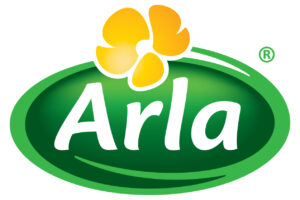Arla Foods
Selected Topic
Promoting sustainable production and food sovereignty, Supporting resilient and sustainable supply chains, Strengthening vulnerable groups.
Project Description
At the Innovation forum, Arla Foods would like to open a window into the activities of its Innovation Farms Network across Europe and its Demonstration Farm in Nigeria, which have been established to promote sustainable production and food sovereignty in developing countries, to support the development of resilient and sustainable supply chains in Europe and beyond, while strengthening vulnerable groups.
The European dairy cooperative, Arla Foods, which includes more than 1,400 farmer owners from Germany, is collaborating with farms in different ways to accelerate agricultural progress and support our farmer owners to drive the future of dairy. We have therefore established a network of Innovation Farms to highlight our on-farm activities and demonstrate how Arla is leading the sustainable dairy agenda, today and in the future. We have Innovation farms in UK, Denmark, Sweden and lastly we have also opened an Innovation farm in North Rhine-Westphalia, Germany. The aim is to: Demonstrate scientific evidence and test new concepts and technology inspire and bring the dairy industry partners together to find the solutions that we need in order to become more sustainable and carbon neutral by 2050.
Apart from the Innovation Farms in our core markets in Europe, we have also developed a Demonstration Farm Concept for our activities in developing countries. In March 2023 Arla Foods cemented its commitment to support local dairy development in Nigeria with inauguration of state-of-the-art farm. Besides housing 216 dairy cows, with the capacity to expand to 750 cows, the Nigerian Demonstration Farm’s main purpose is to facilitate training sessions for local farmers, students and associates at agricultural universities, veterinary students and other relevant groups. The main focus will be on farm management and animal welfare and the training sessions will revolve around feed efficiency, protein efficiency, animal robustness, fertilizer management and land use management.
The farm is the third pillar of Arla’s commitment to the development of the dairy sector in Nigeria and it both builds on top of and taps into the targets of the other two. The first step was The Milky Way Partnership, a public-private partnership, which Arla established in 2016 together with a broad range of stakeholders. The aim was to improve livelihoods and efficiency for local smallholder farmers by capacity building and providing access to basic primary materials. More than 4,200 local farmers took part in the in the training sessions and they have seen an increase in their income of 200 per cent. As a second step Arla expanded on its commitment to develop a sustainable local dairy sector in Nigeria in 2019 by entering into a partnership with the Kaduna State government to establish the Damau Household Milk Farm, a 8,200-hectare ranch project which aims to settle 1000 nomadic dairy farmer households, improve their farming practices and provide a route-to-market for their milk, which goes into production of local dairy products.
About the Institution
Arla Foods is an European dairy cooperative owned by nearly 8,500 Arla farmers from Germany, Denmark, Great Britain, Sweden and BENELUX. The company, with 20,000 employees, generated global sales of 13.8 billion euros in 2022. Arla products are sold in approximately 140 countries around the world and is World largest producer of organic dairy. Germany is not just a market, it’s a home. In Germany, Arla Foods is among the top five dairies & is known under brands such as Arla Bio, Buko & Kærgården. Arla has around 1,650 employees in two dairy plants (Pronsfeld, Rhineland-Palatinate & Upahl, Mecklenburg-Western Pomerania) & headquarter in Düsseldorf. Around 1,400 German farmers owners from the West & the North supply milk to the two dairies. Together with our farmer owners, we want to drive the transition to a more sustainable dairy production. To this end, we have set ourselves ambitious, science-based climate targets for 2030, which have been officially endorsed by the global independent SBTi. Arla pursues an ambitious sustainability agenda: by 2030, CO2e emissions in production, logistics fleet & energy use are to be reduced by 63%, on farms by 30% . By 2050, Arla aims to achieve net zero CO2e emissions.
Contact Person: Kasper Thormod Nielsen

